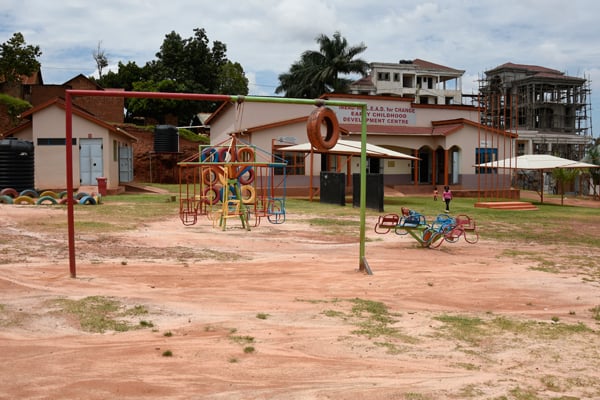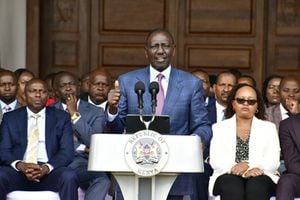Prime
Banished Ugandan-Indians Investing in ECDs

An IREAD Early Childhood Development centre in Kazo. Many experts agree that what children learn in their first years and how they learn it can have long-lasting effects on their future. PHOTO | TREVOR LUTALO
What you need to know:
- His parents operated a general merchandise shop in Kakumiro. He was 18 years old, when President Idi Amin ordered the expulsion of Asians allowing them a 90 day window to exit the country.
Growing up in present day Kakumiro district in the western part of the country, Mr Zahir Lavji and his family were truly Ugandan as anyone could be. Born to Indian parents in the 50s, Mr Lavji and his brothers attended Ugandan schools.
His parents operated a general merchandise shop in Kakumiro. He was 18 years old, when President Idi Amin ordered the expulsion of Asians allowing them a 90 day window to exit the country.
“We applied to different embassies together with my parents and my two brothers. But because I was 18, I could apply on my own, so the Canadian Embassy approved my immigration to Canada before my family,” Mr Lavji explains.
Owing to the turbulent times, he had to travel ahead with only hope that his family would join him there. Later on things would get better for him and his family. He says he was able to attend the best schools, a ‘privilege that has propelled him through the ranks in the pharmacology industry.
Many other banished Ugandans of Indian descent share similar success stories making the expulsion somewhat a blessing in disguise. Mr. Lavji says he was approached by a friend while in Canada about an opportunity to give back to underserved communities in Uganda and he did not look back.
“A friend of mine, Mr Noor Jaffer, had come to Uganda for a vacation, so he decided there was a signal for him to do something with his success. He met with a number of individuals and they asked him to start an early childhood centre in Uganda,” he explains.
Understanding the existing gap and limitations in early education in Uganda, there was a need to invest heavily in grassroots education, giving birth to the Institute for Rural Education and Development (IREAD).

Mr Zahir Lavji, IREAD Chairman
In the last 10 years, IREAD working with several partners including the Ministry of Education and Sports, Rotary International, Church of Uganda and the Kingdom of Buganda have mobilised funding for the construction of 19 Early Childhood Centres (ECD), with the most recent centre inaugurated this year in Kanseka village-Bamunanika, Luwero District.
“To find funding, we decided to identify successful individuals who left Uganda. We convinced them to give back to Uganda and create their legacy in the towns where their parents came from,” Mr Lavji explains.
The IREAD Rotary Liaison, Mr Frederick Kitakule says they have developed an activity oriented curriculum that equips learners between the ages of three to six years with an edge over their counterparts as they progress to primary school.
“The Ugandan education system is quite rigid, it is more of memorisation whereas research has shown each individual develops in a different way and at different speeds. The stimulus that you will thrive on versus me is going to be different,” Mr Kitakule explains.
Many experts agree that what children learn in their first years and how they learn it can have long-lasting effects on their success and health as infants, teens and adults. Different studies have concluded that children under the age of six learn by imitating and replicating what they see, this develops their cognitive, social and emotional abilities.
Research shows that it is extremely important that children are given access to experiences during the first five years of their lives.
Giving back to Koboko
When selecting sites for construction of ECDs, IREAD chairperson, Mr Lavji says it was imperative to erect a school in former President Idi Amin’s village in Koboko to paint a picture of the core values they represent as an organisation.
“As an organisation that lost everything, we believe that it was not the people that kicked us out but it was the individual that did. Forgiving the individual by going to his village and putting a school there is something we believe that would have a positive impact on the community, this would make them believe in the value of tolerance,” Mr Lavji says.
Uganda’s Education Outlook
Dominated by Private education institutions, most government aided schools do not cater for early childhood education which underscores the gap in the quality of education. Learners in the government aided schools start their education at 6 years in primary one without a proper foundation.
Maria Kamushaba, a primary school teacher in Kawempe, Kampala district says it is an uphill task to educate learners that lack the basics such as counting, reciting the alphabet and reciting the common nursery rhymes.
The Ministry of Education and Sports has developed materials to support the provision of quality inclusive Early Childhood Care and Education (ECCE) including the learning framework, the caregivers guide to the learning framework and guidelines for the establishment of ECCE centres.




